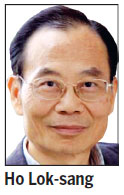'Occupy Central' poll ignores reality
Updated: 2014-06-24 07:11
By Ho Lok-sang(HK Edition)
|
|||||||||
News that the number of people who voted in the poll organized by the "Occupy Central" group had quickly attained over half a million, may surprise some observers. But this is entirely understandable in view of the belief, stirred up by the mass and social media, that Hong Kong people's basic rights are under threat and that they need to defend them by voting in the "Occupy Central" poll.
It is unfortunate that Hong Kong people have a lack of understanding of the law. If they understood the importance of the Basic Law, they would not choose to arbitrarily deviate from it as do those who espouse civil nomination. If they understood that the Basic Law is binding for the central government, they would not believe that rejecting civil nomination was aimed at depriving Hong Kong people of their right to nominate a candidate of choice for election as Chief Executive.
The Basic Law went through an arduous process of consultation and legislation. It is Hong Kong's most important piece of legislation. This is because it lays the foundation for all the rights and responsibilities of Hong Kong people. At the same time, it spells out the rights and responsibilities of the central government to Hong Kong. The Basic Law is binding on all parties. No poll or referendum can change the rights and responsibilities of any of the concerned parties. The notion that if a sufficient number of people turn up to express their demands, Beijing will grant Hong Kong people civil nomination is incorrect. Beijing is simply not permitted to deviate from the Basic Law.

It is a mystery how Hong Kong people, who recognize the importance of the rule of law, can be so ignorant about it. Some insist that what is not explicitly precluded by the Basic Law should be allowed. However, when the Basic Law specifically stipulates that the Chief Executive is to be elected by "universal suffrage upon nomination by a broadly representative Nominating Committee in accordance with democratic procedures," it certainly rules out nomination by any other means. This viewpoint has been confirmed by the Hong Kong Bar Association of Hong Kong and the Hong Kong Law Society.
Since the white paper was released, the message that the central government is tightening control over Hong Kong was circulated on social media in the SAR. But the white paper says no such thing. The white paper only explains the source of Hong Kong's autonomy in its historical context. The central government is subject to the Basic Law and hopes that Hong Kong people will also see themselves as subject to the Basic Law and understand that their rights are protected. Indeed the white paper emphasizes that the Basic Law is in force and should be respected. Under the Basic Law, the central government is committed to a high degree of autonomy for Hong Kong.
I believe it is important to take all opinion polls seriously, even though the results of polls do not carry any legal weight. I take opinion polls seriously in order to gauge people's desires. Opinion polls are like marketing surveys; many firms conduct marketing surveys to understand what consumers want. But the concerns of citizens, as reflected in polls, serve only to inform policymakers as to what people need - not how their concerns can be met. How such concerns are addressed is a matter which has to be decided with an understanding of the implications of other alternatives or options available.
The three options for CE nomination on the ballot sheets of the "Occupy Central" poll are all illegal. Even if the results of the poll were to show considerable support for an illegal nomination arrangement this would not make that arrangement legal.
The Shiji (Historical Records) recounts the famous story of governor Ximen Bao of Ye County during the Warring States period. After solving a problem in the county, which had its roots in ancient superstition, he remarked: "People rejoice when problems are resolved, but they cannot be counted on to find solutions."
This statement could be construed as the governor's disdain for the lack of wisdom shown by the people. But the fact is that diverse self-interested, misguided perceptions and misunderstandings all play a role in preventing the emergence of a workable policy which best serves the public interest.
The public interest is the best interest for all in a given society. That is what is meant by "Loving the Country and Loving Hong Kong". The public interest is not defined by the ruling elite. It is defined by every individual in the community. Judges as well as officials are supposed to serve the public interest. Only in this sense are they expected to "love the country and love Hong Kong".
The author is director of the Center for Public Policy Studies at Lingnan University.
(HK Edition 06/24/2014 page9)